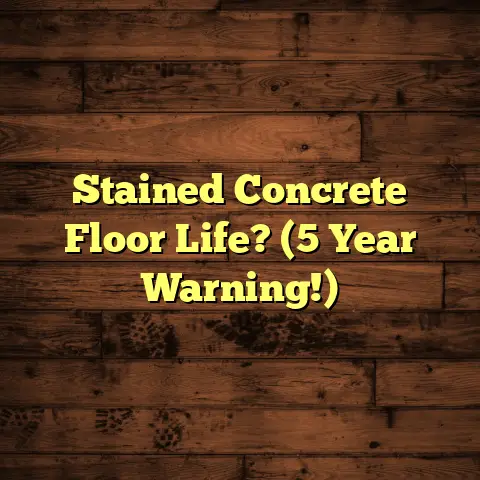Garage Floor Coating Costs: Expect This! (5 Top Secrets)
Expect This! (5 Top Secrets)
As a flooring contractor with years of experience, I know how much a good garage floor coating can transform your space.It’s not just about looks; it’s about protecting your concrete, making cleanup a breeze, and even adding value to your home.
But let’s be real, the cost of garage floor coatings can vary wildly. And a lot of that depends on where you live.
Think about it: a garage in sunny Arizona faces different challenges than one in snowy Minnesota.
That’s why understanding your regional needs is the first step in budgeting for your garage floor project.
I’m going to break down the real costs, share insider secrets, and help you make the smartest decision for your garage and your wallet. Let’s dive in!
Section 1: Understanding Regional Needs
Your garage isn’t just a place to park your car; it’s a micro-environment. And that environment is heavily influenced by your region.
From the scorching heat of the desert to the icy grip of winter, the climate plays a huge role in what kind of coating you need.
But it’s not just the weather; it’s also how you use your garage and what local regulations you need to consider.
Climate Impact
Let’s talk weather.
If you live in a place with extreme temperature swings, like the Midwest, your garage floor is constantly expanding and contracting.
This can put a lot of stress on the coating, leading to cracks and peeling if you don’t choose the right material.
In humid climates like Florida, moisture is the enemy. You need a coating that’s not only water-resistant but also breathable to prevent moisture from getting trapped underneath.
And in areas with harsh winters and road salt, like the Northeast, you need a coating that can stand up to chemical exposure and abrasion.
I’ve seen countless garage floors ruined by neglecting the climate factor.
Don’t make the same mistake!
Usage Patterns
How do you use your garage? Is it just for parking your car, or is it also a workshop, a storage space, or a home gym?
In suburban areas, I often see garages used for a bit of everything. That means the floor needs to be tough enough to handle dropped tools, spilled fluids, and heavy equipment.
In more rural areas, garages might be used for storing ATVs, tractors, or other heavy machinery. In that case, you’ll need a coating that can handle serious weight and abrasion.
And if you’re a car enthusiast who loves to tinker with your ride, you’ll want a coating that’s resistant to oil, gasoline, and other chemicals.
Matching the coating to your usage is key to long-term durability.
Local Regulations and Codes
Did you know that some cities have regulations about the types of coatings you can use in your garage?
It’s true! Some areas have restrictions on VOCs (volatile organic compounds) for environmental reasons.
Other regulations might dictate specific safety requirements, like slip resistance.
I always recommend checking with your local building department before starting any flooring project.
Ignoring these regulations can lead to fines, delays, and even having to redo the entire job.
Trust me; it’s not worth the hassle.
Availability of Materials
Believe it or not, the availability of certain coating materials can vary by region.
In industrial areas, you might find a wider selection of heavy-duty epoxy and polyaspartic coatings.
In more residential areas, you might see more DIY-friendly options like paint-on epoxy kits.
The popularity of certain brands and formulations can also influence pricing.
If a particular coating is in high demand in your area, you can expect to pay a premium.
I’ve seen situations where the same product costs significantly more in one state than in another simply due to supply and demand.
Section 2: Breaking Down the Costs of Garage Floor Coatings
Alright, let’s get down to the nitty-gritty: the costs.
There are three main categories to consider: materials, labor, and preparation.
Each of these can vary depending on your region, the type of coating you choose, and the condition of your existing floor.
Material Costs
Here’s a quick rundown of the most common types of garage floor coatings and their average costs per square foot:
- Epoxy: \$3 – \$7
- Polyurethane: \$4 – \$8
- Polyaspartic: \$5 – \$10
- Acrylic: \$2 – \$5
These are just averages, of course.
The actual cost will depend on the quality of the product, any additives or pigments you choose, and where you buy it.
For example, a high-solids epoxy with metallic pigments will cost significantly more than a basic water-based epoxy.
And if you’re buying from a specialty retailer, you can expect to pay a premium compared to a big-box store.
Keep in mind that these prices can fluctuate based on your location. For example, I’ve seen prices for epoxy coatings in California being 15-20% higher than in Texas due to stricter environmental regulations and higher demand.
Always shop around and compare prices from multiple suppliers.
Labor Costs
If you’re not a DIYer, you’ll need to factor in labor costs.
This can vary widely depending on your location, the complexity of the job, and the experience of the contractor.
In general, you can expect to pay between \$2 and \$5 per square foot for professional installation.
However, in high-cost-of-living areas like New York City or San Francisco, labor costs can be significantly higher.
I always recommend getting at least three quotes from different contractors.
Don’t just go with the cheapest option.
Consider their experience, reputation, and the quality of the materials they use.
A good contractor will be able to assess your specific needs and recommend the best coating for your garage.
Preparation Costs
Before you can apply any coating, you need to prep the floor.
This usually involves cleaning, repairing cracks, and possibly leveling the surface.
Preparation costs can range from \$1 to \$3 per square foot, depending on the condition of your floor.
If your floor is heavily stained or has a lot of cracks, you might need to invest in grinding or shot blasting to create a smooth, even surface.
This can add significantly to the overall cost.
In regions with older homes, like the Northeast, I often see garages with uneven floors that require extensive leveling.
This can increase the prep costs by as much as 50%.
Don’t skimp on preparation! It’s the foundation for a long-lasting, beautiful floor.
Section 3: The Top 5 Secrets to Understanding Garage Floor Coating Costs
Okay, now for the good stuff: the secrets that can save you money and headaches.
I’ve learned these over years of working in the flooring industry, and I’m happy to share them with you.
Secret 1: Know Your Material
Choosing the right material for your specific regional conditions is crucial.
It’s not just about cost; it’s about longevity.
For example, if you live in a cold climate, you’ll want a coating that’s flexible enough to handle temperature fluctuations without cracking.
Polyaspartic coatings are a great option for cold climates because they cure quickly and are very durable.
However, they’re also more expensive than epoxy.
In warmer climates, you might be able to get away with a less expensive epoxy coating.
But make sure it’s UV-resistant to prevent fading and discoloration.
I’ve seen homeowners try to save money by using the wrong material, only to have to replace it within a few years.
Do your research and choose wisely!
Secret 2: Timing is Everything
Believe it or not, the time of year can affect the cost of your garage floor coating project.
Demand for flooring services tends to peak in the spring and summer.
This means that contractors are often busier during these months, and they may charge higher prices.
If you’re looking to save money, consider scheduling your project in the fall or winter.
Contractors are often more willing to negotiate during these slower months.
Plus, material prices may be lower due to decreased demand.
I’ve seen homeowners save as much as 10-15% by scheduling their projects in the off-season.
Secret 3: DIY vs. Professional Installation
DIY garage floor coating kits can be tempting, especially if you’re on a tight budget.
But before you grab that roller, consider the potential hidden costs.
First, DIY kits often use lower-quality materials than professional-grade coatings.
This means they may not last as long or stand up to heavy use.
Second, proper preparation is crucial for a successful coating job.
If you don’t have the right tools or experience, you could end up with a peeling, uneven floor.
Third, if you make a mistake, you’re on your own.
A professional contractor will guarantee their work and fix any problems that arise.
I’ve seen countless DIY projects go wrong, costing homeowners more money in the long run to fix the mistakes.
If you’re not confident in your abilities, it’s best to hire a professional.
Secret 4: Maintenance Matters
Once your garage floor is coated, it’s important to maintain it properly.
This will help extend its lifespan and prevent costly repairs.
Regular cleaning is essential.
Sweep or vacuum the floor regularly to remove dirt and debris.
For spills, use a mild detergent and a soft cloth.
Avoid using harsh chemicals or abrasive cleaners, as these can damage the coating.
In regions with harsh winters, be sure to remove road salt from your tires before parking in the garage.
Salt can damage the coating over time.
I recommend resealing your garage floor every few years to maintain its protective properties.
Secret 5: Hidden Costs and Discounts
Finally, be aware of potential hidden costs and look for discounts.
Some contractors may charge extra for moving items out of the garage or for disposing of old flooring.
Be sure to ask for a detailed quote that includes all costs.
Also, check with local suppliers and manufacturers for discounts or deals.
Some companies offer discounts to veterans, seniors, or first responders.
I’ve also seen manufacturers offer rebates on certain products during specific times of the year.
Don’t be afraid to negotiate!
Contractors are often willing to work with you to find a price that fits your budget.
Conclusion
Choosing the right garage floor coating can be a daunting task, but it doesn’t have to be.
By understanding your regional needs, breaking down the costs, and following these five secrets, you can make an informed decision that will protect your garage floor for years to come.
Remember to do your research, get multiple quotes, and choose a contractor you trust.
A well-coated garage floor is an investment that will pay off in the long run.
Call to Action
What are your experiences with garage floor coatings?
Have you encountered any unexpected costs or challenges?
Share your stories and questions in the comments below!
I’m here to help you make the best decision for your garage.





